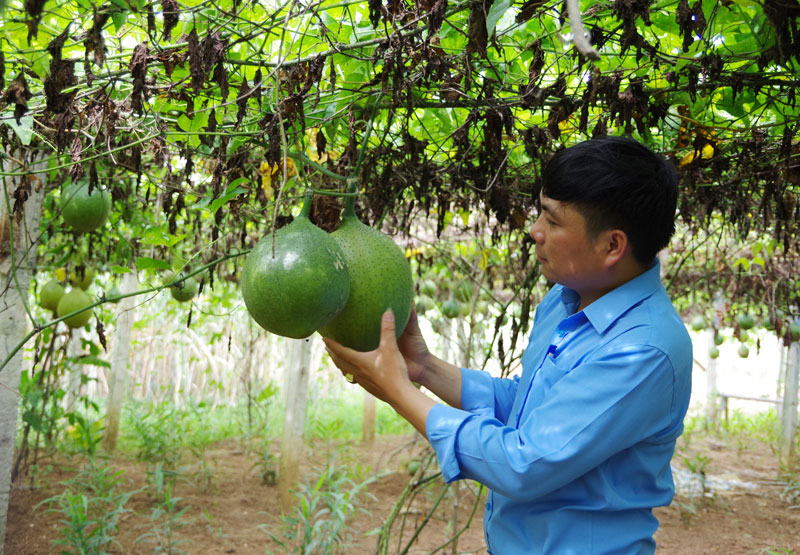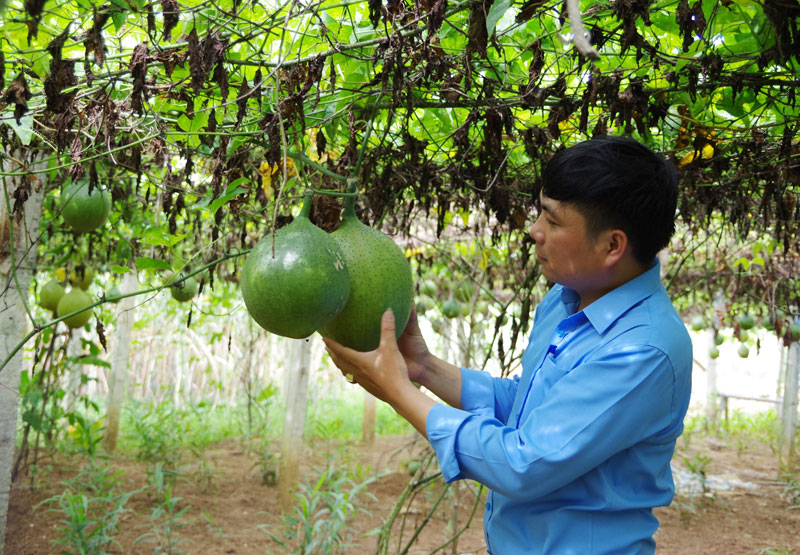
(HBO) – Despite having 2 hectares of farming land, Bui Van Tuoi, secretary of the youth union of Dung Phong commune, Cao Phong district, Hoa Binh province, does not plant orange as other locals do. He cultivates Dien grapefruit, Gac fruit (Momordica cochinchinensis), ginger and red sugar cane. With his own way, Tuoi successfully develops economic growth models.
Bui Van Tuoi, Dung Phong commune, Cao Phong district, succeeds in planting a new variety of Gac fruit which gives high economic values.
Tuoi, one of the 85 outstanding youths nationwide hounoured with the Luong Dinh Cua Award by the Ho Chi Minh Communist Youth Union Centre Committee in 2016, was arranging Gac fruits on trellises which are set up amid sugar canes.
Tuoi said he was born in a rural area grounded in agricultural production. like many households in the commune, his family used to live on farming and sugar cane cultivation. However, difficulties always chased them. The difficult situation motivated him to pursue study in order to change life. On advice of his relatives, Tuoi chose to study agriculture economy at the Community College. After graduating the college in 2006, he came back home with worries about what type of plants to cultivate since at that time, all households in Dung Phong planted only sugar canes. Then, when the trend of planting citrus trees was developing in Cao Phong, Tuoi, with knowledge gained at school, used part of his family’s farming land to cultivate citrus trees.
Unlike other locals who shifted from cultivating sugar cane to orange, Tuoi planted Dien grapefruit. With 30 million VND collected from selling sugar cane and a 50 million VND mortgage on his house, Tuoi transformed his family’s garden into a Dien grapefruit orchard.
Three years later, the orchard provided the first fruits. The small amount of money collected from selling grapefruits motivated Tuoi to try harder. His efforts paid off as he then pocketed hundreds of millions of Vietnam dong each year. In 2011, Tuoi planted an additional 1.5 hectares of CS1 orange in line with VietGap standards. The orange orchard earns him about 500 million VND annually.
After learning from experience in planting Gac fruit in Luong Son, Tuoi turned more than 1,500 sq.m of sugar cane into a Gac fruit orchard which has earned him tens of millions of Vietnam dong since 2015. It is clear that Gac fruit offers higher value and requires fewer workforce.
With the transformation in production, Tuoi has generated regular jobs to 5-10 labourers, even 20-25 people during the peak time.
According to data from the Hoa Binh Provincial Party Committee, the industrial production index for the first six months of 2025 is estimated to have increased by 20% compared to the same period last year. This marks the highest year-on-year growth rate for this period since 2020.
In the first six months of 2025, Hoa Binh province’s export turnover was estimated at 1.145 billion USD, marking an 18.11% increase compared to the same period in 2024. Import turnover was estimated at $ 804 million, a 17.15% increase, which helped the province maintain a positive trade balance.
The lives of the ethnic minority farmers in Tan Lac district have gradually improved thanks to the new directions in agricultural production. This is a testament to the collective strength fostered through the professional associations and groups implemented by various levels of the district’s Farmers’ Union.
With the motto the "product quality comes first,” after nearly one year of establishment and operation, Muong village’s Clean Food Agricultural and Commercial Cooperative, located in Cau Hamlet, Hung Son Commune (Kim Boi district), has launched reputable, high-quality agricultural products to the market that are well-received by consumers. The products such as Muong village’s pork sausage, salt-cured chicken, and salt-cured pork hocks have gradually carved out a place in the market and they are on the path to obtaining the OCOP certification.
In the past, the phrase "bumper harvest, rock-bottom prices" was a familiar refrain for Vietnamese farmers engaged in fragmented, small-scale agriculture. But today, a new spirit is emerging across rural areas of Hoa Binh province - one of collaboration, organisation, and collective economic models that provide a stable foundation for production.
Maintaining growing area codes and packing facility codes in accordance with regulations is a mandatory requirement for agricultural products to be eligible for export. Recently, the Department of Agriculture and Environment of Hoa Binh province has intensified technical supervision of designated farming areas and packing facilities to safeguard the "green passport" that enables its products to access international markets.



